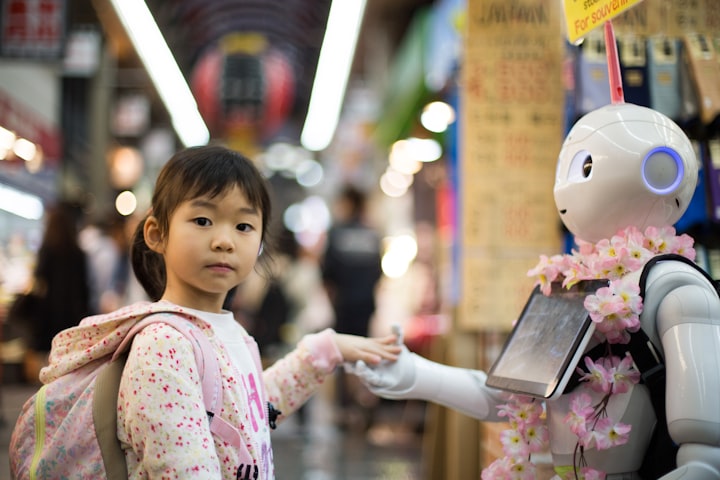AI's Impact on Human Life
The Influence of AI Across Multiple Domains

Unquestionably, deep and varied changes have been made to our lives as a result of artificial intelligence (AI). The impact of AI may be seen in many different sectors, from revolutionizing businesses to improving everyday experiences. This essay examines the amazing ways that AI has impacted our lives.
AI has become a game-changer in the healthcare industry. AI can analyze enormous volumes of medical data and help with more accurate disease diagnosis via machine learning algorithms. AI-driven systems can also anticipate and spot patterns in patient data, allowing for earlier disease detection and more individualized treatment strategies. Furthermore, robotic surgery with AI assistance has increased precision, reducing risks and enhancing patient outcomes.
Due to AI, the transportation industry has seen a considerable revolution. AI-powered autonomous vehicles can completely change how we commute. They can optimize fuel usage, improve traffic flow, and improve road safety. Navigation systems using artificial intelligence (AI) now frequently offer drivers real-time traffic updates and route suggestions.
The entertainment sector has been impacted by AI, which has improved our experiences. AI-powered recommendation engines provide personalized material based on our choices, whether it be films, music, or literature. Artificial intelligence (AI) is used by virtual assistants like Siri, Alexa, and Google Assistant to recognize and carry out voice instructions, making technology use more natural and intuitive.
Artificial intelligence-powered chatbots are widely used in the customer care sector. They can respond quickly and offer support with a variety of consumer inquiries. Chatbots can comprehend and reply to human language using Natural Language Processing (NLP) algorithms, which increases customer satisfaction and speeds up response times. Companies may improve their goods and services by using AI-driven sentiment analysis to better understand client comments and sentiments.
Through recommendation engines, AI has completely changed the e-commerce landscape. AI algorithms offer personalized product recommendations, optimizing the shopping experience and increasing sales, by examining user behavior, purchase history, and browsing habits. Virtual shopping assistants powered by AI can also direct customers through their online buying experience, making personalized recommendations and assisting with decision-making.
The impact of AI has completely changed the educational landscape. Intelligent tutoring systems use AI algorithms to modify educational material and customize it to each student's needs. Systems that are driven by AI can analyze and evaluate student work and provide fast feedback. Artificial intelligence (AI) and virtual reality (VR) and augmented reality (AR) technologies produce immersive learning experiences that make learning more interesting and participatory.
The study of finance and banking has substantially advanced thanks to AI. Systems for detecting fraud can now recognize suspicious patterns and behaviors thanks to machine learning algorithms, protecting financial transactions. Chatbots powered by AI improve consumer interactions with banks by offering knowledge, account management, and transaction support. Additionally, market trends and data are analyzed by AI algorithms to help with portfolio management and investment decisions.
Artificial intelligence (AI) can solve problems and increase productivity in the agricultural sector. To offer useful insights into crop health, soil conditions, and weather patterns, AI systems analyze data from sensors, satellites, and drones. Precision agriculture is made possible by this data-driven methodology, which optimizes resource use and raises crop yields. Robots with AI capabilities can do labor-intensive jobs like planting, harvesting, and weeding.
AI has completely changed how we interact with technology and communication voice assistants can interpret and carry out our instructions to make reminders, respond to questions, or operate smart home devices thanks to Natural Language Processing (NLP) algorithms. AI-driven language translation software eliminates linguistic barriers, promoting cross-cultural interaction and worldwide communication.
However, ethical questions are raised by AI's transformational potential. Responsible AI technology research and application are required due to worries about data privacy, algorithmic prejudice, and employment displacement. To fully utilize AI for the good of humanity, innovation, and ethical behavior must be in harmony.
In conclusion, AI has significantly altered many aspects of human life. It has revolutionized e-commerce, redefined education, advanced finance and banking, optimized agriculture, revolutionized communication, improved healthcare, revolutionized transportation, improved entertainment experiences, and revolutionized customer service. To build a future in which AI enhances human potential and promotes a better society, it is crucial to ensure its ethical and responsible application.
About the Creator
Zenia Samson
Hi, I'm Zenia and I love to get information and know the facts as I believe in the motto of "Knowledge is power" and I would love to be a powerful person.
Here im going to share my power with you
Thanks!






Comments
There are no comments for this story
Be the first to respond and start the conversation.